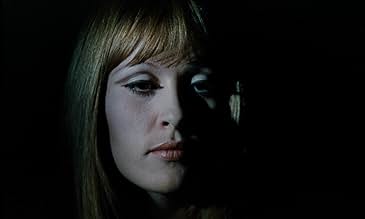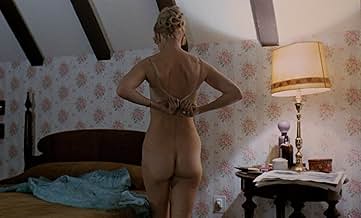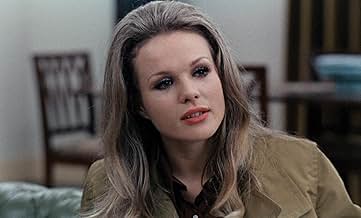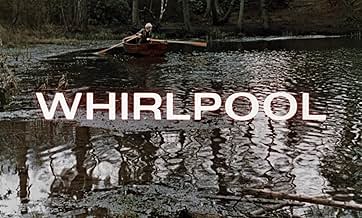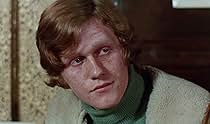A rich older woman living in a country house brings home a new model to be photographed by a young enigmatic photographer who lives with her. The unsuspecting girl becomes entangled in a web... Read allA rich older woman living in a country house brings home a new model to be photographed by a young enigmatic photographer who lives with her. The unsuspecting girl becomes entangled in a web of sex, abuse and death.A rich older woman living in a country house brings home a new model to be photographed by a young enigmatic photographer who lives with her. The unsuspecting girl becomes entangled in a web of sex, abuse and death.
- Director
- Writers
- Stars
- Director
- Writers
- All cast & crew
- Production, box office & more at IMDbPro
Featured reviews
I had read about this notorious, X-rated grindhouse classic for years, and finally watched it over the holidays. It's shockingly brutal, nihilistic and sexual, even by today's standards. The debut feature of Jose Larraz, a Spanish director known for high-end sleaze, a la Jess Franco, it's quite well-shot, but has a script that's nearly non-existent and shamelessly rips-off better, iconic films such as PSYCHO, PEEPING TOM and REBECCA. Lead actress Vivien Neves was a stunning supermodel in her day, but couldn't act wet in a rainstorm. The actress who really made an impression is a Danish woman (it was a co-production between Denmark and Spain, but shot in the UK) named Pia Andersson, as the evil "Aunt Sarah." She has several exquisite moments, mostly without dialogue, where her remarkable face displays a host of emotions, mostly pain and loneliness. And the odd thing is, she seems to have vanished after this film. I can find nothing about her on the 'net. Very strange. The ending, which I'm sure influenced Wes Craven's LAST HOUSE ON THE LEFT several years later (even more so than Bergman's VIRGIN SPRING, which it shamelessly ripped off) is truly sickening and disturbing, and has stayed with me for the past week, not in a good way. Ultimately, this is one of those films made right after the rating system was established where the sole purpose was "Anything goes!" and boy, does it. Interesting as a time capsule artifact, but ultimately, it's pretty pointless, not to mention very, very nasty.
Not as vile as other reviews have suggested, although certainly sordid and lurid, but it also does a great job of building tension and an uncomfortable mood and is a worthwhile thriller.
Young aspiring fashion model Tulia visits the country house of Sarah and her "nephew" Theo, under a pretence that Theo is something of a young prodigy who will take brilliant photos of Tulia to kick-start her career. However, the ulterior motive is to be a toy in Sarah's regular threesomes. An air of danger and mystery is established early on due to the unsatisfying explanations given regarding the disappearance of Sarah's previous lover, Rhonda, who stayed at the house under similar circumstances. The film presents several possible culprits, including Theo, Sarah, a strange flute-playing figure in the woods and a possible supernatural element.
The performances are good, with. Karl Lanchbury as Theo being particularly memorable. He is creepy, manipulative and yet charismatic enough to keep Tulia and the audience guessing as to his motivations.
The ending is a little disappointing and abrupt; it really just goes through some predictable motions and ends on a sordid and unpleasant note. All in all, though, this is an effective and gripping thriller.
Young aspiring fashion model Tulia visits the country house of Sarah and her "nephew" Theo, under a pretence that Theo is something of a young prodigy who will take brilliant photos of Tulia to kick-start her career. However, the ulterior motive is to be a toy in Sarah's regular threesomes. An air of danger and mystery is established early on due to the unsatisfying explanations given regarding the disappearance of Sarah's previous lover, Rhonda, who stayed at the house under similar circumstances. The film presents several possible culprits, including Theo, Sarah, a strange flute-playing figure in the woods and a possible supernatural element.
The performances are good, with. Karl Lanchbury as Theo being particularly memorable. He is creepy, manipulative and yet charismatic enough to keep Tulia and the audience guessing as to his motivations.
The ending is a little disappointing and abrupt; it really just goes through some predictable motions and ends on a sordid and unpleasant note. All in all, though, this is an effective and gripping thriller.
"Whirlpool" follows a British model who is lured to an older woman's picturesque country estate where a young male photographer, whom she refers to as her nephew (and she, his aunt), reside. Things seem odd at first, but they only get worse and worse.
The first feature from José Ramón Larraz, "Whirlpool" contains many of the director's early stylistic hallmarks: dreary woods, picturesque country homes, sexual repression galore, clueless fashion models, and a mean-spirited edge as blunt as a dull knife. His more well-known early feature, "Symptoms", would further expound on ideas and themes present in "Whirlpool", and perhaps more elegantly; and his third feature, "The House That Vanished", boasts a similar setting and premise. That being said, there is no less a grisly allure to this film that is unmistakable.
Narratively speaking, one has to suspend disbelief on occasion for this film to really work (for example, the protagonist, Tulia, accepts the invitation to the country house despite the fact that one of her model cohorts disappeared after visiting some weeks before). That being said, one could view the film as something of a cautionary tale warning against the dangers of naiveté, where the Tulia character becomes something of a Hansel & Gretel figure, drawn into this web by her own imperviousness. The film is slow-going early on and tends to drag in the middle, as the perverse relationship between the "nephew" and "aunt" characters comes into clearer view. In the end, though, it all hurtles toward a nasty conclusion that feels inspired by Ingmar Bergman's "The Virgin Spring", and strangely predicts the type of violence in Wes Craven's reimagining of that film, "The Last House on the Left", which was released two years after "Whirlpool".
All in all, this is a moody and bitter film that, despite its fairly single-note story, manages to pack a few knives to the gut. If nothing else, "Whirlpool" serves as the stylistic template for which Larraz would base his subsequent features. 7/10.
The first feature from José Ramón Larraz, "Whirlpool" contains many of the director's early stylistic hallmarks: dreary woods, picturesque country homes, sexual repression galore, clueless fashion models, and a mean-spirited edge as blunt as a dull knife. His more well-known early feature, "Symptoms", would further expound on ideas and themes present in "Whirlpool", and perhaps more elegantly; and his third feature, "The House That Vanished", boasts a similar setting and premise. That being said, there is no less a grisly allure to this film that is unmistakable.
Narratively speaking, one has to suspend disbelief on occasion for this film to really work (for example, the protagonist, Tulia, accepts the invitation to the country house despite the fact that one of her model cohorts disappeared after visiting some weeks before). That being said, one could view the film as something of a cautionary tale warning against the dangers of naiveté, where the Tulia character becomes something of a Hansel & Gretel figure, drawn into this web by her own imperviousness. The film is slow-going early on and tends to drag in the middle, as the perverse relationship between the "nephew" and "aunt" characters comes into clearer view. In the end, though, it all hurtles toward a nasty conclusion that feels inspired by Ingmar Bergman's "The Virgin Spring", and strangely predicts the type of violence in Wes Craven's reimagining of that film, "The Last House on the Left", which was released two years after "Whirlpool".
All in all, this is a moody and bitter film that, despite its fairly single-note story, manages to pack a few knives to the gut. If nothing else, "Whirlpool" serves as the stylistic template for which Larraz would base his subsequent features. 7/10.
I saw this in the theater way back when.My memory fails over the years but I wish I could see it again.I remember it as a slezzy sort of teasing film except for the ending.Thats what made the film and why so many try to find it today.Alas with no luck.If you can find it,tell the WORLD!!
Do you know that numb feeling of watching a movie and, after about 35-40 minutes into it, you suddenly realize that nothing - absolutely nothing - even remotely interesting or exciting has happened so far? "Whirlpool" gave me that annoying feeling. There's a creep rowing in a canoe for an awfully long time, and an uptight wealthy 40-something woman is parading around in her mansion. That about covers the first quarter. The two apparently live together as aunt and nephew (yeah, sure) and they are both deviant pervs. The aunt is a lesbian with a fetish for luring naïve fashion models to the house, and the nasty nephew photographs them. They all play strip poker together, and the pretty model is too unfathomably stupid to leave even though she gets humiliated, or simply because these two persons are utter loonies!
"Whirlpool" was the first long-feature film of the Spanish born José Ramón Larraz and enjoys somewhat of a cult status because it was presumed lost for several years. Well, I'm a big fan of Larraz and deeply admire several other films he made, but "Whirlpool" could have remained lost as far as I'm concerned. It's unpleasant, but not in a way that uncanny & gritty 70s exploitation flicks should be unpleasant. It's insufferably dull and slow-paced, and not at all compelling because you don't care for any of the characters. Vivian Neves, for example, is truly gorgeous - but with her clothes on and without - but her character is so incredibly naïve and brainless that you can't cheer for her. Regarding J. R. Larraz' resume, I can highly recommend "Vampyres", "Symptoms", "Rest in Pieces" and "Edge of the Axe". Even "The House that Vanished", "La Muerta Incierta", and "The Coming of Sin" are worthwhile, but this one (and "Deadly Manor") are quite worthless.
"Whirlpool" was the first long-feature film of the Spanish born José Ramón Larraz and enjoys somewhat of a cult status because it was presumed lost for several years. Well, I'm a big fan of Larraz and deeply admire several other films he made, but "Whirlpool" could have remained lost as far as I'm concerned. It's unpleasant, but not in a way that uncanny & gritty 70s exploitation flicks should be unpleasant. It's insufferably dull and slow-paced, and not at all compelling because you don't care for any of the characters. Vivian Neves, for example, is truly gorgeous - but with her clothes on and without - but her character is so incredibly naïve and brainless that you can't cheer for her. Regarding J. R. Larraz' resume, I can highly recommend "Vampyres", "Symptoms", "Rest in Pieces" and "Edge of the Axe". Even "The House that Vanished", "La Muerta Incierta", and "The Coming of Sin" are worthwhile, but this one (and "Deadly Manor") are quite worthless.
Did you know
- TriviaThe film disappeared for several decades until Arrow Video restored it and re-released it on Blu-ray in 2019.
- GoofsDuring the striptease card game, the bottle of liquor moves from one side of the table to the other, in back-to-back shots. Also, the amount of liquor in the bottle goes from half-full to nearly empty.
- Alternate versionsBritish censors cut lesbian sex scenes between Tulia and her aunt, a woodland rape, and a bedtime threesome.
- ConnectionsReferenced in Drive-in Movie Memories (2001)
- How long is Whirlpool?Powered by Alexa
Details
- Release date
- Countries of origin
- Language
- Also known as
- Perversion Flash
- Filming locations
- England, UK(location)
- Production company
- See more company credits at IMDbPro
Contribute to this page
Suggest an edit or add missing content


